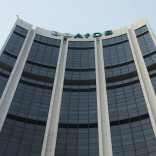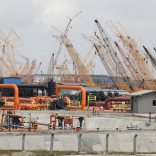Three West African countries to quit UN top court
How a recession is rudely interrupting the Africa Rising story

Tunji Andrews, a 36-year-old Nigerian PR consultant, and his wife are the type of consumers multinational companies and consultancies see as being the drivers of growth in Africa’s most populous nation.
The much-hyped African middle class — young professionals starting families, eating out and aspiring to buy homes and insurance — fuelled the “Africa rising” narrative when commodities prices were high.
Now, with oil prices half what they were when Mr Andrews and his wife married, Nigeria is hurtling towards its first full-year recession since 1991. Since June, when the central bank abandoned a currency peg to the US dollar, the naira has lost more than 30% of its value on the official market and is trading at a far weaker level on the parallel, or black, market.
Though Mr Andrews, a new father, says his income is the highest it has ever been, his purchasing power has dropped steadily over the past two years, reflecting the plummeting value of the naira since oil prices crashed.
“It’s scary,” he says, noting that costs for fuel for his generator and his car keep rising.
Inflation sped to 17.6% last month, up from 17.1% in July and 9.3% in August 2015, showing how much food and fuel prices have been affected by the oil prices.
But Mr Andrews says he is relatively fortunate in comparison to the tens of millions of Nigerians — including almost half of the youth labour force, according to the national statistics office — who are now unemployed or underemployed.
With the impact of the devalued naira not yet fully reflected in prices, Nigerians like Mr Andrews — as well as multinational and local businesses — are making tough choices and taking a long-term view.
They are not helped by capital controls, introduced by the central bank last year. Although the government hopes the measures will eventually encourage fully integrated local supply chains and reduce import dependency, for now they have hammered the local manufacturing sector, driven up prices and contributed to slowing growth.
George Nassar, MD for Nigeria at Procter & Gamble, the largest US non-oil investor in the country and maker of household staples such as Ariel washing products, says his company began feeling the slowdown sparked by the oil price crash in late 2014. Margins are continuing to shrink as customers buy smaller quantities or lower-quality varieties of products such as nappies and sanitary towels.
“We now have to plan quarter by quarter,” he says, to navigate the uncertain times. “We need the price of oil to move … if by summer next year, things are turning around, we’d be happy.”
At the same time, multinationals that have decades of history in Nigeria stress they are committed to the country and to ensuring their products are available to consumers at prices they can afford.
“Though the cost of production has gone up with the devaluation of the naira, companies are not able to pass through the full increase to the consumers, as disposable income continues to go down,” says an executive at a foreign-owned fast-moving consumer goods company. He says that, to avoid huge price rises, companies are looking “inwards” for raw materials. Though investing is difficult, “there will be a demand burnout at higher sales prices, the markets will slowly adjust to the new reality”.
Seki Mutukwa, equities researcher at Renaissance Capital in London, says limited access to foreign currency for imports is pushing companies to find more supplies locally. Flour Mills, the country’s biggest miller, has been encouraging farmers to plant more sorghum and maize to use instead of imported wheat. Mr Mutukwa says that, although gross margins are likely to continue to contract for the largest fast consumer goods companies, those that produce lower cost or “value” versions of popular goods, such as beer, are increasing their market share.
“You are seeing consumers trading down,” he says, noting the market share of Hero, a lower-priced lager made by SABMiller, increased to 4.9% last year, compared to 1.1% in 2013.
Though the recession is not likely to ease soon, companies and consumers will make ends meet. As Lagos-based fashion blogger and style icon Noble Igwe has told his followers: “It’s not what you’re wearing but how you wear it.” He adds: “Before, anything that would be seen as luxury, expensive, or fashionable had to be foreign. Now, as long as you can stylishly pull it off, whether it’s local or foreign made, it works.”












Leave a Reply
Be the First to Comment!
You must be logged in to post a comment.
You must be logged in to post a comment.